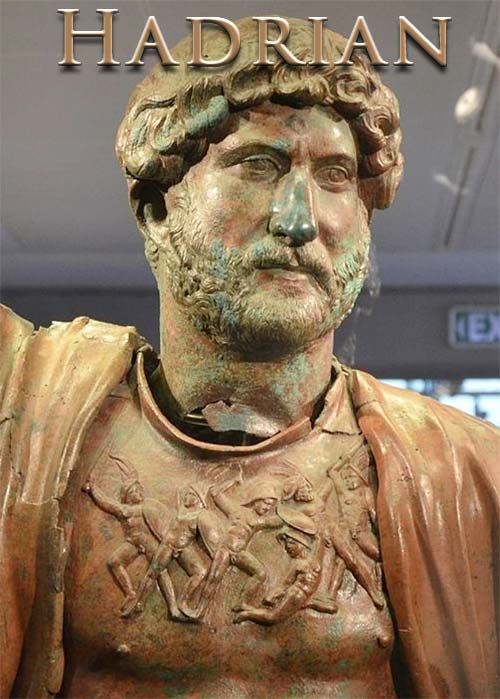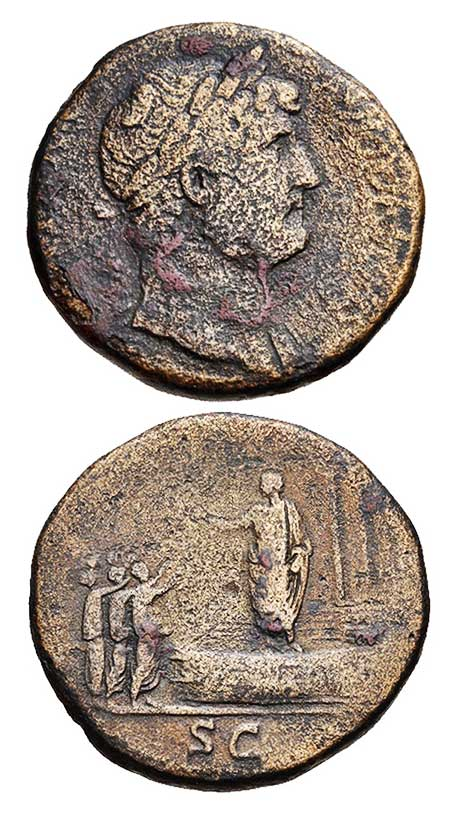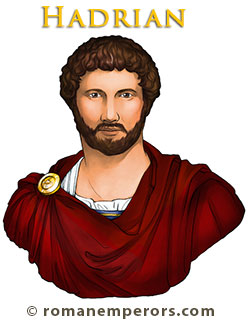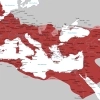Roman Emperor Hadrian
117 - 138 A.D.
Publius Aelius Hadrianus Augustus
Busts, Statues, Coins, Information, Maps, Images, and More

Hadrian: The Architect Emperor – A Reign of Consolidation, Cultural Exchange, and Enduring Legacy
Hadrian, who reigned as Roman emperor from 117 to 138 AD, stands as a multifaceted figure in history. He was a skilled military leader, a passionate architect, a philhellene (lover of Greek culture), and a shrewd administrator who focused on consolidating the vast Roman Empire. His reign, though overshadowed by the conquests of his predecessor Trajan, was a period of remarkable stability, cultural flourishing, and innovative building projects.
From Iberian Soldier to Trusted Successor
Born Publius Aelius Hadrianus in 76 AD in Hispania Baetica (modern-day southern Spain), Hadrian's early life was steeped in military tradition. He rose through the ranks of the Roman army, proving himself a capable soldier on campaigns in Germania and North Africa. His friendship with Trajan, who recognized his talents and loyalty, became pivotal. Trajan adopted Hadrian in 117 AD, securing his position as heir apparent.
A Consolidation Strategy and the Renunciation of Conquests
Upon assuming the throne, Hadrian made a crucial decision. He recognized the difficulty of maintaining Trajan's vast empire and opted for a strategy of consolidation. He withdrew from territories conquered in the East, focusing on strengthening existing borders and improving infrastructure within the empire. This pragmatic approach ensured stability and prevented the empire from overextending itself.
Hadrian's Wall: A Monumental Defense Project
One of Hadrian's most famous undertakings was the construction of Hadrian's Wall in northern Britain. This formidable barrier, stretching 73 miles from coast to coast, aimed to secure the frontier against barbarian incursions. It served as a powerful symbol of Roman authority and engineering prowess, enduring as an impressive testament to Hadrian's strategic vision.
Beyond Walls: A Patron of the Arts and Architecture
Hadrian, unlike many emperors focused solely on warfare, harbored a deep appreciation for Greek culture. He embarked on extensive travels throughout the empire, visiting Greece, Egypt, and Asia Minor. He actively promoted Hellenistic culture, fostering a period of artistic flourishing. His architectural endeavors extended beyond Hadrian's Wall. He commissioned the Pantheon's dome in Rome, a masterpiece of engineering, and the Temple of Venus in Rome, showcasing his dedication to beautification and cultural exchange.
The Persecution of Christians and a Complex Legacy
Hadrian's reign was not without its dark spots. He ordered the persecution of Christians, fearing their growing influence and potential threat to the traditional Roman religion. This episode blemishes his legacy, highlighting the intolerance that sometimes accompanied Roman rule.
A Turning Point in Succession: The Choice of Antoninus Pius
One of Hadrian's most significant decisions was the adoption of Antoninus Pius, a man known for his administrative skills and philosophical bent. This choice marked a shift in imperial succession, prioritizing merit and stability over blood ties. This paved the way for the Antonine Dynasty, a period of relative peace and prosperity.
A Legacy of Stability, Infrastructure, and Cultural Exchange
Hadrian's reign, though lacking the military grandeur of Trajan's, laid the foundation for a period of stability and cultural flourishing. He consolidated the empire, addressed infrastructure concerns, and fostered a vibrant cultural exchange between Rome and Greece. His architectural achievements continue to inspire awe, and his pragmatic leadership ensured a smooth transition for his successors.
Beyond the Historical Narrative: A Glimpse into Hadrian's Personality
Historical accounts portray Hadrian as a complex individual, with a love for the arts and a passion for travel. He was also known for his temper and paranoia, particularly towards the end of his life. These complexities add to the intrigue surrounding this multifaceted emperor.
Hadrian's enduring legacy lies in his contributions to Roman infrastructure, his dedication to cultural exchange, and his pragmatic leadership that ensured stability during a crucial period in Roman history.

More to Come

"The Traveller"
Hadrian was named as third of the "Five Good Emperors". He was born in Rome in 76 A.D., his parents were Spaniards, and Hadrian was a relative of Trajan. Hadrian was very interested in the Greek culture, he also loved to travel, and was a devoted builder. When he became Emperor he avoided any further hostilities in the newly Roman territories of Armenia and Mesopotamia. He was very wise to abandon the eastern part of the Roman Empire, and make the border the Euphrates River. Hadrian would rather focus on his empire. He traveled throughout nearly all the provinces to understand them more fully, and utilize funds wherever needed. In the western portion he built the famous "Hadrian's Wall" between England and Scotland in 122 A.D. He also rebuilt the Pantheon in Rome, which was originally built by Agrippa in 27 B.C. but was struck by lightning. He also built a beautiful villa at Tibur (Tivoli) with decorated reliefs of scenes from his journeys throughout the provinces. He also erected his own elaborate tomb near the Tiber, the great circular mausoleum where he was buried, which is known today as Castel San Angelo. Just a glance at some of his building projects reveals evidence of so much wealth and prosperity during his lifetime. He encouraged education and art, and was determined to revive Greece and Rome's past glories. When Hadrian came to the land of Judea in 130 A.D. he saw the decimation of Jerusalem, and he established and beautified a new city, he named it "Aelia Capitolina" after his family name Aelius, and the three Capitoline gods Jupiter, Juno, and Minerva. He also erected a temple to Jupiter on the site of the Second Temple, according to the Greek historian Dio Cassius*. The Jews were outraged and the Second Great Jewish War against Rome broke out, known as the Great Jewish War of Bar Kochba. This was no small war according to Dio Cassius*, and Hadrian had to call on his most trained generals to put down the revolt. The war lasted from 131-135 A.D. Three years after the Jewish War Hadrian died at a city near Naples in 138 A.D. at the age of 62.
*Roman History by Lucius Cassius Dio 69.12

















Latest




Popular




Useful




